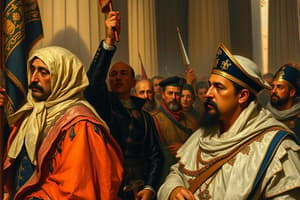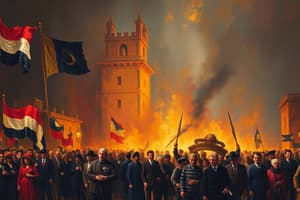Podcast
Questions and Answers
The Egyptian Revolution of 1919 was primarily against the French occupation of Egypt.
The Egyptian Revolution of 1919 was primarily against the French occupation of Egypt.
False (B)
The Egyptian Revolution led to Great Britain's recognition of Egyptian independence in 1922.
The Egyptian Revolution led to Great Britain's recognition of Egyptian independence in 1922.
True (A)
The British occupied Egypt to protect their interests in the Panama Canal.
The British occupied Egypt to protect their interests in the Panama Canal.
False (B)
During WWI, the Ottoman Empire sided with the Allied Powers.
During WWI, the Ottoman Empire sided with the Allied Powers.
Egypt became a British protectorate after separating from the Ottoman Empire during WWI.
Egypt became a British protectorate after separating from the Ottoman Empire during WWI.
President Wilson's Twelve Points promised Egyptian self-government
President Wilson's Twelve Points promised Egyptian self-government
Saad Zaghloul led a delegation of Egyptian activists to request an end to the British protectorate and representation at the Paris Peace Conference.
Saad Zaghloul led a delegation of Egyptian activists to request an end to the British protectorate and representation at the Paris Peace Conference.
The Gallipoli campaign was a battle in the Sinai Peninsula.
The Gallipoli campaign was a battle in the Sinai Peninsula.
During March 15-31, only a few Egyptians were killed and very few villages were burned down.
During March 15-31, only a few Egyptians were killed and very few villages were burned down.
The strikes were exclusively led by trade unions and transport workers.
The strikes were exclusively led by trade unions and transport workers.
By July 25, 1919, approximately 800 Egyptians had died, and 1,600 others had sustained injuries.
By July 25, 1919, approximately 800 Egyptians had died, and 1,600 others had sustained injuries.
The mass movement in Egypt never involved women or people of different faiths.
The mass movement in Egypt never involved women or people of different faiths.
The British Prime Minister, David Lloyd George, sent a commission of enquiry to Egypt in December primarily to discuss trade.
The British Prime Minister, David Lloyd George, sent a commission of enquiry to Egypt in December primarily to discuss trade.
The report to Lloyd George recommended that the protectorate status of Egypt should be maintained indefinitely.
The report to Lloyd George recommended that the protectorate status of Egypt should be maintained indefinitely.
Britain completely and unconditionally withdrew all its forces from Egypt on February 22, 1922.
Britain completely and unconditionally withdrew all its forces from Egypt on February 22, 1922.
Saad Zaghloul became the first elected King of Egypt in 1924.
Saad Zaghloul became the first elected King of Egypt in 1924.
The mass movement for the full independence of Egypt and Sudan was organized using the tactics of military engagement.
The mass movement for the full independence of Egypt and Sudan was organized using the tactics of military engagement.
The Wafd Party was an Egyptian political party that had little support among the Egyptian people.
The Wafd Party was an Egyptian political party that had little support among the Egyptian people.
Zaghloul and other movement leaders were exiled to Cyprus by the British.
Zaghloul and other movement leaders were exiled to Cyprus by the British.
Students at Al-Azhar University were the last to join the revolutionary uprising.
Students at Al-Azhar University were the last to join the revolutionary uprising.
On March 11th lawyers stopped their strike and returned to work.
On March 11th lawyers stopped their strike and returned to work.
More than 3,000 demonstrators in the delta city of Tanta successfully stormed the rail station.
More than 3,000 demonstrators in the delta city of Tanta successfully stormed the rail station.
Both Huda Sha'arawi and Safia Zaghloul were wives of exiled Egyptian nationalist politicians and lead the protests against the British.
Both Huda Sha'arawi and Safia Zaghloul were wives of exiled Egyptian nationalist politicians and lead the protests against the British.
Egyptian nationalist women played no significant role in organizing strikes and boycotts of British goods.
Egyptian nationalist women played no significant role in organizing strikes and boycotts of British goods.
Flashcards
Khedivate of Egypt
Khedivate of Egypt
An autonomous province of the Ottoman Empire that was occupied by Britain in 1882.
Protectorate
Protectorate
A territory under the control of another country, but not fully annexed.
Egyptian Nationalists
Egyptian Nationalists
Egyptian political leaders and activists who advocated for independence from British control.
President Wilson's Fourteen Points
President Wilson's Fourteen Points
Signup and view all the flashcards
Egyptian Nationalist Delegation
Egyptian Nationalist Delegation
Signup and view all the flashcards
British High Commissioner
British High Commissioner
Signup and view all the flashcards
Paris Peace Conference
Paris Peace Conference
Signup and view all the flashcards
Self-determination
Self-determination
Signup and view all the flashcards
Civil Disobedience
Civil Disobedience
Signup and view all the flashcards
Wafd Party
Wafd Party
Signup and view all the flashcards
Malta
Malta
Signup and view all the flashcards
Egyptian Revolution of 1919
Egyptian Revolution of 1919
Signup and view all the flashcards
Al-Azhar University
Al-Azhar University
Signup and view all the flashcards
Safia Zaghloul
Safia Zaghloul
Signup and view all the flashcards
Huda Sha'arawi
Huda Sha'arawi
Signup and view all the flashcards
Sabotage
Sabotage
Signup and view all the flashcards
1919 Egyptian Revolution
1919 Egyptian Revolution
Signup and view all the flashcards
National general strike in Egypt (1919)
National general strike in Egypt (1919)
Signup and view all the flashcards
David Lloyd George
David Lloyd George
Signup and view all the flashcards
Saad Zaghloul
Saad Zaghloul
Signup and view all the flashcards
Egyptian Independence Declaration (1922)
Egyptian Independence Declaration (1922)
Signup and view all the flashcards
Saad Zaghloul (as Prime Minister)
Saad Zaghloul (as Prime Minister)
Signup and view all the flashcards
British Control of Sudan and Suez Canal Zone (1922)
British Control of Sudan and Suez Canal Zone (1922)
Signup and view all the flashcards
Study Notes
The Egyptian Revolution of 1919
- The revolution was a countrywide revolt against British occupation of Egypt and Sudan
- It occurred after World War I, leading to British recognition of Egyptian independence in 1922
- British occupation of Egypt began in 1882, following the Urabi Revolt and Anglo-Egyptian War in 1882
- Egypt was made a British protectorate in 1914, separating from the Ottoman Empire
- Egyptian nationalists viewed the protectorate as temporary, expecting change after WWI
- Egypt played a significant role in WWI, providing soldiers, resources (labor), and supporting the Allies
- Promised self-governance during WWI by the Allies (including President Wilson's Fourteen Points) spurred demands for independence
Background
- The Urabi Revolt (1882) triggered British occupation
- WWI led to heightened British presence in Egypt as a staging ground for military campaigns
- British conscription of Egyptians, and requisitioning of resources created resentment
Timeline
- 1882-1914: British occupation (Khedivate of Egypt)
- 1914-1922: Egypt becomes a British protectorate
- 1919: Nationalist revolution following WWI
- 1922: Egypt gains independence
Events
- 1919: Saad Zaghloul and nationalist activists formed a delegation to protest the British protectorate in Egypt and demand self-determination
- Exiled Egyptian nationalist leaders's arrest sparked widespread civil disobedience and demonstrations
- Students, workers, and other Egyptians protested across Egypt, including strikes and boycotts
- Violence Escalated, widespread strikes, boycotts and acts of sabotage
- Egypt's participation in WWI efforts and Britain's promises of self-determination fueled the demand for independence
- The revolution involved significant participation from women
Aftermath
- 1922: British government granted Egypt independence.
- However, Britain kept military presence and control over Sudan as well as retaining control of resources (e.g., Suez Canal)
- The revolution's declaration was significant in galvanizing movements for independence in other African and Asian countries.
Key Figures
- Saad Zaghloul: A key leader in the Egyptian nationalist movement
- Huda Sha'arawi: A prominent Egyptian feminist actively involved in the revolution.
- David Lloyd George: British Prime minister.
Studying That Suits You
Use AI to generate personalized quizzes and flashcards to suit your learning preferences.




